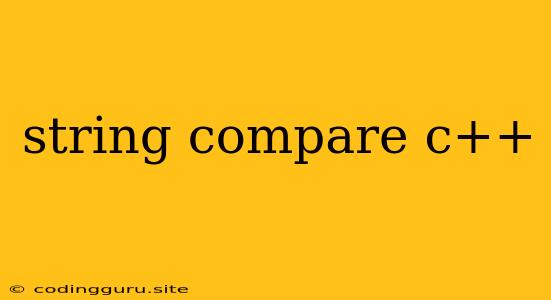String Compare in C++: A Comprehensive Guide
String comparison is a fundamental task in many C++ programs. It allows you to determine the relationship between two strings, whether they are equal, one is lexicographically smaller than the other, or they are completely different. This article will guide you through the essential aspects of string comparison in C++ and equip you with the knowledge to effectively compare strings in your programs.
Understanding String Comparison
Before delving into the C++ methods, let's clarify what string comparison entails. In essence, it involves examining the characters of two strings and determining their order based on the ASCII (American Standard Code for Information Interchange) values of those characters.
- Lexicographical Order: This is the primary comparison method. It follows a dictionary-like arrangement where strings are compared character by character. The string with the lexicographically smaller first character is considered smaller. If the first characters are equal, the comparison proceeds to the second characters, and so on.
- Equality: Two strings are considered equal if they have the same characters in the same order.
C++ Methods for String Comparison
C++ provides several convenient methods for comparing strings. Let's explore some of the most commonly used techniques:
1. Using strcmp()
The strcmp() function is a standard library function available in the <cstring> header file. It takes two C-style strings (null-terminated character arrays) as input and returns an integer value that indicates the relationship between them:
- 0: The strings are equal.
- Negative value: The first string is lexicographically smaller than the second string.
- Positive value: The first string is lexicographically larger than the second string.
#include
#include
int main() {
const char* str1 = "hello";
const char* str2 = "world";
int result = strcmp(str1, str2);
if (result == 0) {
std::cout << "The strings are equal." << std::endl;
} else if (result < 0) {
std::cout << "The first string is smaller than the second string." << std::endl;
} else {
std::cout << "The first string is larger than the second string." << std::endl;
}
return 0;
}
2. Using strncmp()
The strncmp() function is a powerful variant of strcmp(). It allows you to compare only a specific portion of the strings, starting from the beginning up to a specified number of characters. This can be useful when you need to perform partial comparisons.
#include
#include
int main() {
const char* str1 = "hello";
const char* str2 = "hello world";
int result = strncmp(str1, str2, 5);
if (result == 0) {
std::cout << "The first 5 characters of both strings are equal." << std::endl;
} else {
std::cout << "The first 5 characters of the strings are not equal." << std::endl;
}
return 0;
}
3. Using std::string::compare()
For comparing std::string objects, C++ offers the compare() method. This method provides a flexible way to compare strings, with options to specify the comparison range and case sensitivity.
#include
#include
int main() {
std::string str1 = "hello";
std::string str2 = "world";
int result = str1.compare(str2);
if (result == 0) {
std::cout << "The strings are equal." << std::endl;
} else if (result < 0) {
std::cout << "The first string is smaller than the second string." << std::endl;
} else {
std::cout << "The first string is larger than the second string." << std::endl;
}
return 0;
}
4. Using Comparison Operators
For simple equality checks, you can directly use comparison operators like == and != on std::string objects.
#include
#include
int main() {
std::string str1 = "hello";
std::string str2 = "hello";
std::string str3 = "world";
if (str1 == str2) {
std::cout << "str1 and str2 are equal." << std::endl;
}
if (str1 != str3) {
std::cout << "str1 and str3 are not equal." << std::endl;
}
return 0;
}
Choosing the Right Method for String Comparison
The choice of string comparison method depends on the specific requirement:
strcmp(): Use this method for comparing C-style strings.strncmp(): Use this when you need to compare only a part of the strings.std::string::compare(): Use this for flexible comparisons withstd::stringobjects, including options to specify the comparison range and case sensitivity.- Comparison Operators: Use these for simple equality checks between
std::stringobjects.
Case Sensitivity
The default behavior of the strcmp(), strncmp(), and std::string::compare() functions is case-sensitive. This means that "hello" is considered different from "Hello." To perform case-insensitive comparisons, you can use the tolower() or toupper() functions from the <cctype> header file to convert both strings to the same case before comparing.
#include
#include
#include
int main() {
const char* str1 = "hello";
const char* str2 = "Hello";
// Convert both strings to lowercase for case-insensitive comparison
for (int i = 0; str1[i]; i++) {
str1[i] = tolower(str1[i]);
}
for (int i = 0; str2[i]; i++) {
str2[i] = tolower(str2[i]);
}
int result = strcmp(str1, str2);
if (result == 0) {
std::cout << "The strings are equal (case-insensitive)." << std::endl;
} else {
std::cout << "The strings are not equal (case-insensitive)." << std::endl;
}
return 0;
}
Common Mistakes
- Using
strcmp()withstd::stringObjects:strcmp()is designed for C-style strings, notstd::stringobjects. Using it withstd::stringobjects will result in undefined behavior. - Incorrectly Using
strncmp(): Ensure you specify the correct number of characters for the comparison using the third argument ofstrncmp(). - Ignoring Case Sensitivity: Remember that the default behavior of string comparison functions is case-sensitive.
Conclusion
String comparison is a fundamental skill in C++ programming. Mastering the various methods available, understanding case sensitivity, and avoiding common mistakes will enable you to efficiently compare strings and write more robust code.
